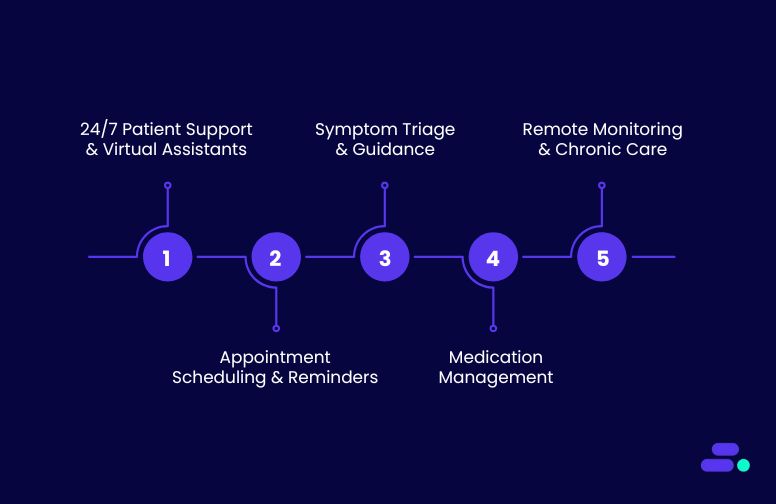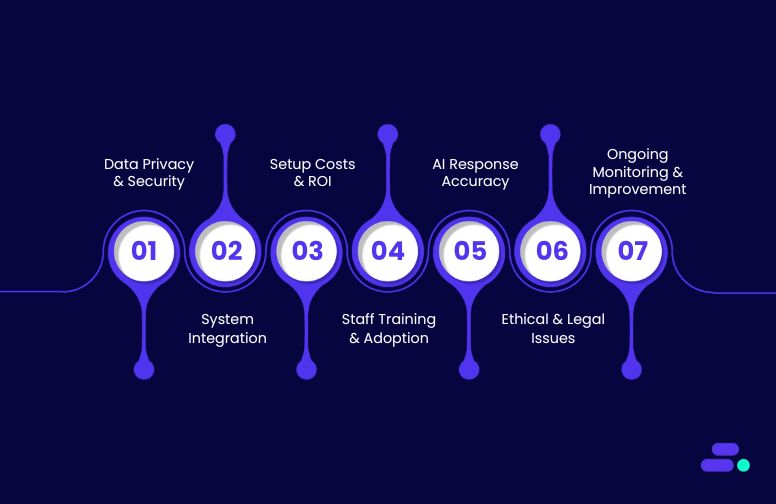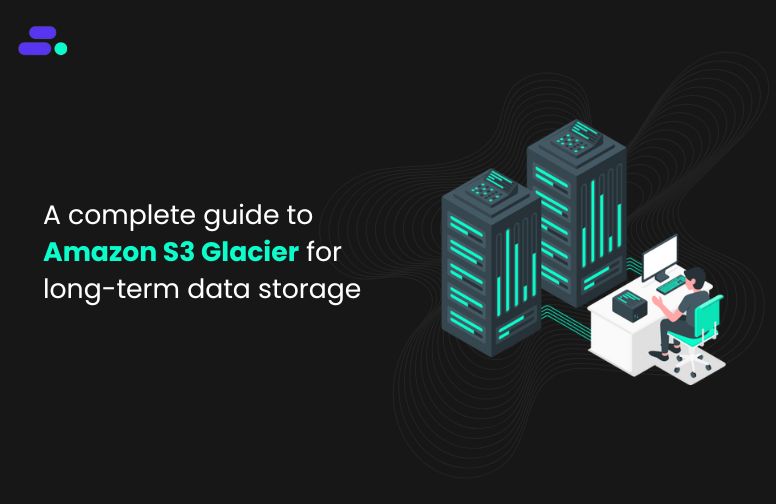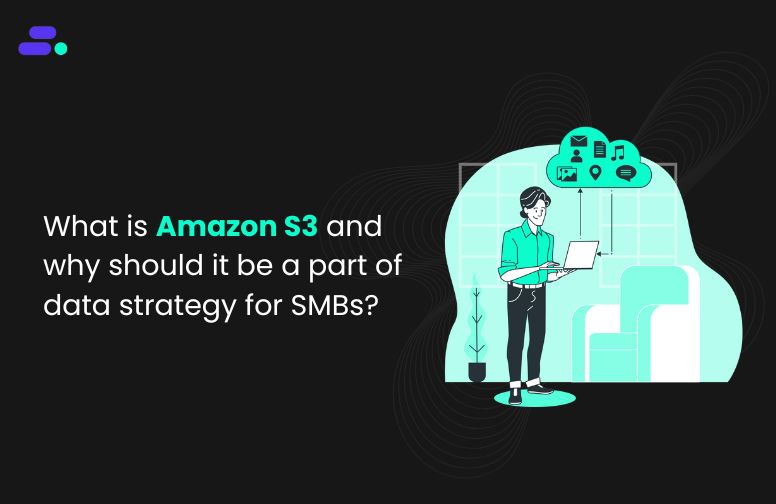This is a div block with a Webflow interaction that will be triggered when the heading is in the view.

Modernize your cloud. Maximize business impact.
Cloud services for small businesses are no longer just optional but necessary for staying competitive. A recent survey found that 94% of businesses say cloud computing has improved their ability to scale and boost productivity.
For small and medium-sized businesses (SMBs), cloud solutions provide the flexibility to grow without the heavy costs and complexity of traditional IT systems.
By adopting cloud services, SMBs can improve security, enhance collaboration, and scale operations more easily. This guide will explore the different types of cloud services, the key benefits for SMBs, and practical tips for implementation.
What are cloud services?
Cloud services refer to computing resources and software hosted online and accessed over the internet, rather than stored on physical hardware within a business. These services include storage, processing power, and applications that allow businesses to scale quickly and efficiently without investing in expensive infrastructure.
Businesses can manage everything from data storage to software solutions through cloud services instead of maintaining in-house IT systems.
Types of cloud services for small businesses

There are three main types of cloud services: Public, private, and hybrid clouds. Each has its own advantages depending on business needs, ranging from cost-effectiveness to security.
1. Public cloud: Sharing platform and cost benefits
The public cloud is a shared platform where third-party providers like AWS, Microsoft Azure, or Google Cloud provide resources over the internet. It is cost-effective because businesses only pay for what they use and don’t need to invest in expensive hardware.
This model is ideal for businesses looking for scalable resources without the overhead. For example, a company might use the public cloud to host websites or store customer data.
2. Private cloud: Control and security compliance
A private cloud provides a dedicated environment for a business, offering greater control over performance and configuration. This solution allows businesses to customize their cloud infrastructure to meet specific needs, whether it's handling sensitive data or optimizing performance for particular tasks.
For example, businesses in industries with unique infrastructure requirements may opt for a private cloud to maintain a more tailored setup for their operations. While it provides greater control, the private cloud is one of many cloud options businesses can consider based on their requirements for flexibility, security, and scalability.
3. Hybrid cloud: Combination of public and private resources
A hybrid cloud combines both public and private cloud services, giving businesses the best of both worlds. They can store sensitive data on a private cloud while using public cloud resources for less critical tasks. This setup provides flexibility, security, and scalability.
For example, an SMB might use a hybrid model to store healthcare or patient data on a private cloud while running customer-facing applications on the public cloud.
Each cloud type offers unique benefits, allowing businesses to select the one that best suits their needs for scalability, security, and cost management.
How do cloud services work?
Cloud services operate through multiple technologies and principles that make them flexible, scalable, and efficient for businesses. Here’s a simplified breakdown:
- Remote servers: Cloud services run on powerful remote servers located in data centers. These servers handle all the heavy lifting, processing, storing, and managing data.
- Internet access: Users connect to these servers via the internet, accessing business applications and files without requiring physical hardware.
- Resource allocation: Cloud providers dynamically allocate resources such as storage and computing power based on user demand.
- Data security and management: Cloud providers manage security, backups, and updates to protect data and maintain system stability, while customers share responsibility for secure usage.
Cloud services come in different models, like the infrastructure as a Service (IaaS), Platform as a Service (PaaS), and Software as a Service (SaaS), giving SMBs flexibility in how much they manage.
For example, IaaS like Amazon EC2 provides raw computing resources, PaaS such as AWS Elastic Beanstalk offers managed development environments, and SaaS delivers ready-to-use applications, helping SMBs reduce IT overhead.
AWS operates multiple data centers grouped into regions and availability zones, which ensures fault tolerance and low latency. This geographic distribution helps SMBs maintain business continuity and quickly recover from outages.
Additionally, features like auto-scaling automatically adjust compute capacity in response to real-time demand, effectively balancing cost and performance.
Plus, its elasticity allows businesses to scale resources up or down based on demand, while giving comprehensive control over infrastructure with advanced management and security tools. It's designed for businesses that need more flexibility and specialized services to run complex operations smoothly.
It’s also important for SMBs to understand the shared responsibility model. While AWS secures the physical infrastructure and network, businesses are responsible for managing their data, access controls, and application security. To keep cloud spending under control, AWS offers tools like AWS Cost Explorer, AWS Budgets, and Amazon EC2 Reserved Instances, empowering SMBs to optimize costs as they scale.
Cloudtech, an AWS partner, helps SMBs modernize their IT environments. By helping organizations optimize cloud infrastructure and adopt scalable, secure AWS services, Cloudtech ensures ongoing performance, governance, and efficiency aligned with business growth.
Top 5 cloud storage solutions for small businesses
Choosing the right cloud storage solution is key to keeping data secure, accessible, and organized. Whether a business is growing its team or handling sensitive information, the right platform can simplify operations and help the business scale smoothly. Here are some top-rated options to consider in 2025:
1. Amazon Web Services (AWS)
AWS is a solid choice for flexibility and reliability. With services like Amazon S3 and Amazon Elastic Block Store (EBS), businesses can store everything safely and at scale. Additionally, AWS offers a range of other services, including Amazon EC2, Amazon RDS, AWS Lambda, Amazon CloudFront, Amazon VPC, and AWS IAM.
Cloudtech helps businesses use these AWS solutions to scale operations securely and efficiently.
Key features:
- Pay only for the storage used
- Strong encryption and compliance certifications
- Seamless integration with other AWS tools
- Global infrastructure for fast access and backups
AWS works well for businesses planning to scale and requiring full control over how they manage their data.
2. Microsoft Azure
Azure is Microsoft’s cloud platform, providing businesses with integrated solutions for data storage, analytics, and machine learning. It offers hybrid cloud capabilities and seamless integration with Microsoft’s enterprise tools like Office 365 and Windows Server. Azure is known for its advanced security and compliance features, making it a reliable choice for enterprise-level businesses.
Key features:
- Hybrid cloud capabilities to integrate on-premises systems with cloud
- Advanced security features, including multi-factor authentication and encryption
- Scalable storage with low-latency global data centers
- Extensive analytics and machine learning tools for data-driven insights
Businesses are looking for an enterprise-level solution that integrates seamlessly with Microsoft tools and provides a high degree of flexibility for various workloads.
3. Google Workspace (Google Drive)
Google Workspace offers secure cloud storage with seamless collaboration, perfect for SMBs focused on teamwork and productivity. Its integration with Google Docs, Sheets, and Slides facilitates real-time editing and sharing.
Key features:
- Real-time collaboration and file sharing
- Advanced search powered by AI
- Robust security controls and compliance certifications
- Easy integration with numerous third-party apps
4. Dropbox Business
Dropbox Business is a trusted cloud storage service offering flexible sharing and collaboration tools suited for SMBs. It features smart sync to save local disk space and advanced admin controls for security.
Key features:
- Granular permissions and version history
- Seamless integration with Microsoft 365 and Slack
- Strong encryption and compliance support
- Smart sync for efficient file access
5. IBM Cloud Object Storage
IBM Cloud Object Storage is a scalable and secure cloud storage solution designed to meet the growing needs of SMBs. It offers robust data protection and compliance features, making it suitable for businesses requiring reliable and cost-effective storage.
Key features:
- Flexible scalability with multi-cloud support
- Enterprise-grade encryption and compliance certifications (HIPAA, GDPR, SOC 2)
- Global data center presence for fast, reliable access
- Integration with various backup, analytics, and AI tools for enhanced data management
Businesses that deal with sensitive data require a secure, compliant, and user-friendly cloud storage solution.
These cloud services offer real value depending on specific business needs, security, collaboration, media storage, or backup. Businesses should take a moment to think about what matters most and choose the solution that best supports their way of working.
Steps to successfully implement cloud services

Moving to the cloud doesn’t have to be complicated. With the right steps, businesses can shift their systems smoothly, avoid disruptions, and get their teams fully onboard. Here’s how to get started:
Step 1: Identify the needs
Start by reviewing current tools and workflows. Pinpoint areas where time, money, or efficiency are being lost; these are the areas where cloud services can have the most significant impact.
Step 2: Select a cloud provider
Choose a provider that aligns with business goals and technical requirements. Amazon Web Services (AWS) offers scalable, secure, and cost-friendly solutions for small businesses, making it a solid choice for businesses looking to scale efficiently.
Step 3: Set up and migrate
Once a provider is chosen, set up the cloud environment and plan the migration. Files, apps, and systems should be moved gradually to avoid downtime. Testing each part ensures everything works smoothly before the full migration is complete.
Step 4: Train the team
Cloud tools are only as effective as the team's ability to use them. Training should be provided to ensure that everyone knows how to access files, use new apps, and follow security protocols.
Step 5: Keep it smooth and simple
Use checklists, assign responsibilities, and communicate clearly throughout the process. Starting with one department or system first can help ease the transition and build confidence before scaling up.
Considerations for choosing a cloud service
When choosing a cloud service for a business, it’s easy to get caught up in features and pricing. However, what truly matters is how well the service supports business goals, both now and as the business grows. A strong cloud platform should align with five core principles that ensure stability, security, and long-term value. These pillars should guide the decision-making process to find the right fit for a business.
- Operational excellence: A platform should help run day-to-day operations smoothly and adapt quickly when changes occur. Businesses should look for tools that support automation, monitoring, and quick recovery from errors to improve how operations are managed.
- Security: Protecting data is non-negotiable. The right provider will offer strong encryption, access controls, and compliance with standards like HIPAA or GDPR. If a business handles sensitive data, built-in security features should be a top priority.
- Reliability: The cloud service should remain operational even during demand spikes or unexpected issues. Providers with a track record of uptime, automatic backups, and clear guarantees around service availability should be prioritized.
- Performance efficiency: As businesses grow, their technology should keep pace. A cloud platform that offers scalable resources is essential, whether the business is expanding its team, launching new products, or managing increased traffic.
- Cost optimization: A good cloud solution helps businesses control spending. Clear pricing, usage tracking, and the ability to scale up or down without locking into long-term costs should be key considerations. Businesses should only pay for what they use when they use it.
A platform should help run day-to-day operations smoothly and quickly adapt to changes. Businesses should look for tools that support automation, monitoring, and quick recovery from errors to improve how operations are managed.
For example, services like AWS CloudFormation enable SMBs to automate the provisioning and management of cloud resources through code, ensuring consistent and repeatable infrastructure deployments. Additionally, AWS Config helps monitor and evaluate resource configurations continuously, alerting teams to deviations from best practices or compliance requirements, which supports proactive governance and operational resilience.
Benefits & challenges of cloud services
Here’s a quick overview of the benefits and potential challenges SMBs face when using cloud services:
Conclusion
Cloud services for small businesses offer tools to work smarter, scale faster, and stay secure without the high costs of traditional IT. From storage and collaboration to security and performance, the right solution can streamline operations and support long-term growth.
If a business hasn't made the shift yet, SMBs can evaluate their current technology stack to identify areas where AWS services may support more efficient operations and future scalability. Whether better data protection, easier access for remote teams, or room to grow is needed, cloud services can provide the competitive edge.
For businesses looking to modernize their AWS environment, Cloudtech provides expert support in optimizing infrastructure, aligning with AWS best practices, and improving long-term cloud performance.
FAQs
1. Which cloud is better for small businesses?
The best cloud for small businesses depends on their specific needs. Amazon Web Services (AWS) offers scalability and reliability, making it ideal for growing businesses. Microsoft Azure integrates well with existing Microsoft products, while Google Cloud is great for collaboration. If security and simplicity are a priority, Box and Carbonite are also excellent choices for secure file storage and backup solutions.
2. How much do cloud services cost for a small business?
Cloud costs vary by service provider and resources provisioned. On average, small businesses can expect to pay anywhere from $20 to $500 per month, depending on compute, storage, and other services needed. For basic storage and compute services, AWS offers affordable pricing options. It's crucial to choose a plan that fits the usage to avoid unnecessary expenses.
3. Is the cloud good for small businesses?
Yes, cloud services are excellent for small businesses. They offer cost-effective solutions, allowing businesses to scale up or down based on needs, without the heavy costs of traditional IT infrastructure. Cloud services also improve security, enhance collaboration, and provide remote access, making them ideal for modern business needs.

Get started on your cloud modernization journey today!
Let Cloudtech build a modern AWS infrastructure that’s right for your business.

















